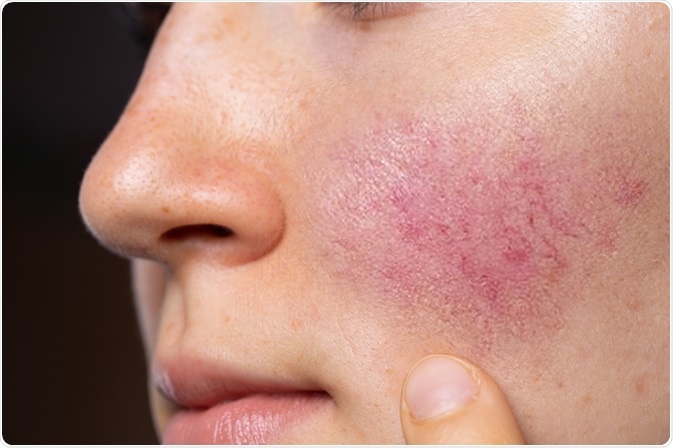Rosacea is a common and long-term inflammatory skin condition that causes facial redness and the development of small, pus-filled bumps called pustules. The condition can also cause a stinging and burning sensation across the face, and small blood vessels may become visible underneath the skin.

A symptom of rosacea. Image Credit: sruilk / Shutterstock
The condition is relapsing and the affected individual experiences periods that are symptom-free or less severe, followed by “flare-ups,” where symptoms suddenly worsen. Some of the symptoms can be controlled to a certain extent with medications, but they can cause significant distress and affect an individual’s self-esteem when they do arise.
According to data from the National Rosacea Society, nearly 14 million Americans aged between 25 and 60 are affected by rosacea. The exact pathophysiology of this condition is not yet known. However, bacterial skin infection and abnormal facial vasculature, and a reaction to microscopic mites on the face have been indicated as possible causes by researchers.
Current research into rosacea generally focuses on the following:
- Finding the exact cause of the condition on a molecular level to help identify potential cures
- Establishing the specific role of the immune system in pathological mechanisms and whether these can be modified
- Genetic research to establish any causative genes
Research
Medications currently undergoing evaluation include both locally applied and orally ingested agents. Among topical agents are immunosuppressants such as pimecrolimus and tacrolimus and retinoids for the treatment of acne. Some oral medications include the antibiotics tetracycline and metronidazole and the retinoid isotretinoin. Trials of alpha-blockers for the treatment of widespread redness are also underway. Ocular rosacea is another major research area where medications that might help reduce the eye problems associated with rosacea are being studied.
Several Cochrane reviews have assessed the therapies available for treating rosacea over the years. These reviews conclude that large, randomized trials are required before definitive recommendations can be put in place.
In 2013, the National Rosacea Society (NRS) awarded funding for two new studies and continued their support for five ongoing studies. Chairman of the society’s medical advisory board, Dr. Mark Dahl says that this research is now enabling a significantly improved understanding of the pathology behind rosacea and potential new therapies to target the disease process.
The new funding will support a study being conducted at the University of California-San Diego that will investigate whether inhibiting mast cell activity alleviates inflammation in individuals with rosacea. This follows a previous study, also funded by the NRS, that suggested mast cells located between the vascular system and the nervous system are the key to triggering the inflammation seen in this condition.
These mast cells appear to have several receptors that can induce a wide range of cellular responses, including those that lead to rosacea symptoms. The research also showed that inflammation symptoms did not develop in mice treated with mast cell stabilizers. In the new study, the researchers will examine whether topical application of a mast cell stabilizer called cromolyn sodium does indeed alleviate symptoms. They will also investigate whether two enzymes (trypatase and chymotryptase) are usually raised in patients with rosacea return to a normal level after the mast cell stabilizer is applied.
The second study that has received NRS funding will occur at the University of California-San Francisco and will investigate the biochemical pathways involved in inflammation. This study is being performed following recent findings that suggested trigger factors such as skin irritation and sunlight stress the endoplasmic reticulum inside cells. The endoplasmic reticulum is a network surrounding the cell nucleus involved in the folding and manufacture of proteins. Triggers that stress this organelle may induce a series of chemical reactions that lead to rosacea symptoms.
The new study will investigate whether inhibition of these pathways will block the effects that lead to symptoms. The study will also examine whether the effects of topical resveratrol and a fatty acid derivative will prevent inflammation symptoms.
Other treatments
Surgical, laser, and other techniques that can help remove excess skin across the face and nose are studied for their efficacy and cosmetic outcomes. A non-laser light therapy technique called pulsed light therapy is also currently being used to evaluate rosacea patients' skin for underlying causes of the condition and as a tool for treating complications such as thread veins and redness.
Rosacea, Causes, Signs and Symptoms, Diagnosis and Treatment.
Further Reading
Last Updated: Feb 9, 2021